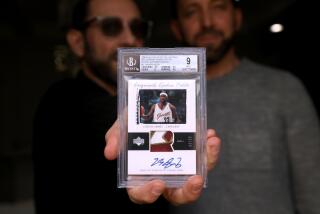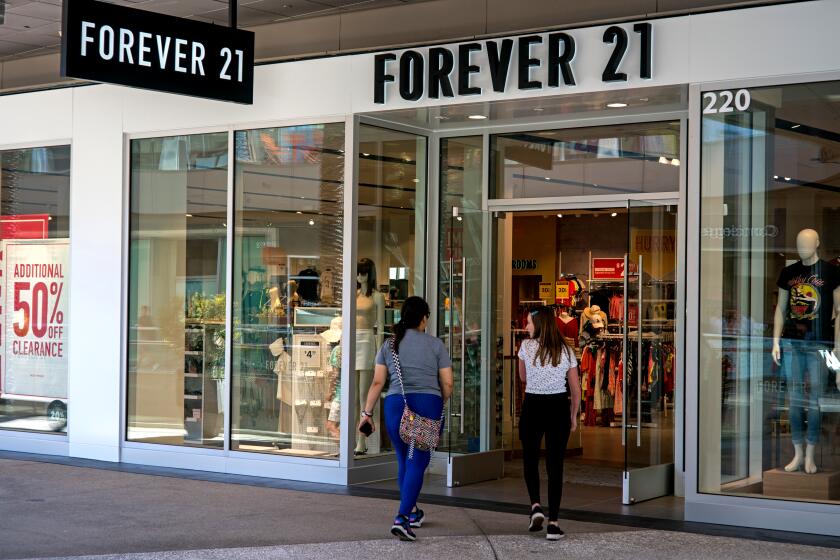Columbia S&L;’s Spiegel Is Indicted on 55 Counts : Banking: Federal grand jury charges that he looted the now-defunct Beverly Hills-based institution.
- Share via
Former Columbia Savings & Loan Chief Executive Thomas Spiegel, whose firm once boasted of being the nation’s best-run thrift, was indicted Wednesday on 55 criminal counts alleging that he looted the Beverly Hills-based institution to support a luxury lifestyle.
The 42-page indictment, handed up by a federal grand jury in Los Angeles, accuses Spiegel of using the now-defunct thrift to reap a wide range of perks for himself, including a $1-million vacation home in Palm Springs, extensive use of Columbia-owned jets, $250,000 in interior design work and tens of thousands of dollars in guns for his personal use.
Spiegel, 46, joins a list of S&L; figures--including former Lincoln Savings & Loan owner Charles H. Keating Jr.--accused of looting thrifts at public expense. Such offenses are a major contributor to the S&L; debacle that is expected to cost taxpayers at least $500 billion over the next 30 to 40 years.
Spiegel, once the nation’s highest-paid thrift executive, is being charged in four broad categories. They include misappropriating at least $20 million from the thrift for his own use and improperly benefiting from Columbia’s business deals. He also is accused of obtaining the interior design work for himself by steering Columbia work to his designer, and failing to tell federal regulators and Columbia directors about hundreds of thousands of dollars in luxurious perks he was receiving.
A sharply worded statement issued by Spiegel’s lawyers said the former executive is relieved that public accusations have finally been made so he can respond in court. The statement added that Spiegel plans “to defend against these charges with all his will and determination and to demonstrate their total lack of substance.”
Spiegel faces a maximum sentence of 275 years in prison, and fines of up to $13 million. He also could face additional charges later in a revised indictment, because several matters, including possible violations of tax laws, are still under investigation.
Spiegel’s lawyers confirmed that he has agreed to formally surrender to authorities Monday at a federal court hearing in Los Angeles, where he will be arraigned. Prosecutors and Spiegel’s lawyers have agreed to set Spiegel’s bond at $1 million, which he is expected to post.
In a related matter Wednesday, prosecutors announced that Santa Barbara auto dealer Howard Schneider has agreed to plead guilty to two felony counts related to $26 million in loans and loan renewals that Columbia made to Schneider, allegedly as part of a scheme to help Spiegel gain a 50% interest in Schneider’s Gregg Motors. Authorities also are alleging that Spiegel knowingly accepted phony financial statements from Schneider on behalf of Columbia, which lost between $10 million and $20 million as a result of its involvement with Schneider, authorities allege.
Schneider’s plea is an important development in the case because he has agreed to cooperate with authorities, and is expected to be a key prosecution witness against Spiegel. His luxury car dealership is now in Chapter 11 bankruptcy proceedings, and a sale has been approved by a bankruptcy judge.
Columbia failed in January, 1991, largely because of losses on its huge holdings of real estate and risky, high-yield “junk bonds.” The total cost to taxpayers has been estimated at $1.2 billion.
Columbia was formed in 1974 by Spiegel’s father, Abraham, a prominent real estate developer with close ties to such politicians as Los Angeles Mayor Tom Bradley. Thomas Spiegel took over as chief executive in 1977.
Columbia was briefly the most profitable thrift in the nation, from 1983 to 1987.
Wednesday’s indictment represents the first criminal charges to be brought against Spiegel. Federal thrift regulators have filed pending civil charges, some of which are similar to those in the indictment. The indictment does not include some of the most colorful items alleged by thrift regulators in the civil proceedings, including Spiegel’s European travel, spending money on wine-tasting courses and ordering a “survival chamber” to be built for his protection in a Columbia building. Spiegel has denied the civil charges as well.
Columbia was by far the best customer among thrifts for junk bonds sold through former Drexel Burnham Lambert financier Michael Milken, whom Spiegel met at a party in 1982. The indictment filed Wednesday includes two counts that have their roots in the investigation of Milken by federal authorities in New York. Milken is now serving a 10-year sentence in a Northern California federal prison.
Those counts allege that Spiegel had Columbia buy $78 million in risky securities issued through Drexel to finance the $2.2-billion buyout in 1985 of cable television giant Storer Communications by the investment firm Kohlberg Kravis Roberts & Co. Prosecutors alleged that as a reward for having Columbia help out Drexel, Spiegel was allowed to personally buy for only $132,000 securities that are now worth about $7 million.
Although Spiegel has been the subject of various investigations since the beginning of 1987, the investigation of his perks originated in late 1989 when two former Columbia officers, General Counsel Kenneth R. Heitz and Chief Financial Officer James D’Aquila, first raised questions about Spiegel’s spending. That led to an investigation by the federal Office of Thrift Supervision, which in turn referred the matter to the Justice Department.
The indictment alleges that perks were income that Spiegel never revealed to federal thrift regulators or the Securities and Exchange Commission. They include vacation homes in Utah and Palm Springs, high-powered guns, the use of Columbia’s Gulfstream IV jet and physical therapy services. In one charge spelled out in the indictment, Spiegel allegedly received $250,000 in discounts on interior design work at his Beverly Hills home and at a Palm Springs condominium in exchange for steering design work for Columbia to his designer.
The most bizarre charges deal with Spiegel’s still unexplained involvement with guns. According to the indictment, from 1985 to 1989 Spiegel bought 60 guns for security guards at Columbia and one handgun for each of the thrift’s senior officers. It further alleges that Spiegel bought at least 40 other guns, including assault weapons, for a personal collection stored at his Beverly Hills home. Listed in the indictment are such guns as a Remington 12-gauge shotgun, various Colt and Sig Sauer pistols and a Colt AR-15 assault rifle.
The statement issued by Spiegel’s lawyers took aim at a variety of targets, from prosecutors to Congress and S&L; regulators. It said Spiegel has been subjected to 5 1/2 years of intense scrutiny by seven federal offices, and that “no business associate or personal acquaintance of Mr. Spiegel’s has gone unquestioned” in the investigation.
“No human being has the resources to repel this torrent of federal activity,” the statement said.
The statement also said that millions of taxpayer dollars have been spent trying to charge Spiegel with wrongdoing “in order to cover up the gross incompetence of the S&L; regulators. Those regulators, vested with outrageous powers from a panicked Congress, itself seeking to divert public attention from its major role in the S&L; fiasco and the temporary destruction of the high-yield bond market in 1989 and 1990, have hounded him (Spiegel) daily, restricted his ability to conduct business and have even barred him from paying normal legal fees to defend himself.”
More to Read
Inside the business of entertainment
The Wide Shot brings you news, analysis and insights on everything from streaming wars to production — and what it all means for the future.
You may occasionally receive promotional content from the Los Angeles Times.










